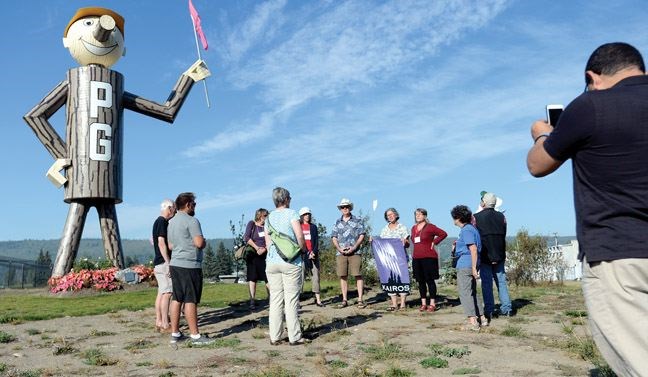A busload of people are trying to pave the road to reconciliation for Canada's historical abuses of aboriginal people one conversation and one community at a time.
The Rolling Justice Bus passed through Prince George Thursday, halfway through its eight-day tour of the province in an effort to start addressing some of the 94 recommendations in the Truth and Reconciliation Commission, published in June.
Janet Gray helped organize the tour as the regional representative for KAIROS BC, a coalition of churches focused on ecological justice and human rights.
"We are specifically very interested in reconciliation and finding ways in which we can stand in solidarity with First Nations people and work at changing the relationships we've had with First Nations as settlers or white people in Canada," she said, also referencing the history of churches and the residential schools "which we are not proud of."
On Thursday morning, the group of almost 20 stood in a circle at the intersection of Highway 97 and Highway 16, known also as the Highway of Tears.
After a moment of silence, Gray read the names of woman after woman, all missing or murdered.
Then the group placed make-shift paper hearts in the ground in front of Mr. PG, each bearing a woman's name or words like "hope" and "justice" scrawled in highlighter.
Much of the stops between Vancouver and Fort St. John are about consulting with communities, Gray said.
"We can't say what the most important issue is for aboriginals," said Gray who, like most on the bus, is non-aboriginal.
"A lot of us are settlers who are trying to raise awareness amongst non-aboriginal Canadians.
"We're creating connections and opportunity for dialogue," Gray said.
Those connections are important to Brenda Wilson John, Highway of Tears coordinator for Carrier Sekani Family Services.
"It's overwhelming," said Wilson John after addressing the group.
"Just the support, more people are recognizing and understanding what we're going through. It brings a comfort to me."
Wilson John has been raising awareness about the disproportionate danger aboriginal women face since her sister Ramona Wilson went missing in 1994. Her body was found 10 months later in Smithers.
"Her murderer is still out there so there is no justice in her case. That is a constant thought that runs through your mind every day," she said.
Last year, an RCMP report showed more than 1,100 aboriginal women have faced that fate in the last three decades.
"It's devastating. Every time a young lady goes missing or is murdered it brings back memories of my sister."
It's been 11 years since Amnesty International released its first research report on missing and murdered indigenous women.
It didn't occur to the group to call for a national inquiry then, said Don Wright, regional activism coordinator.
"Part of the idea is first of course acknowledging past injustices, but what are we doing about it now?" said Wright, adding it's important the organization get outside of the Lower Mainland to help focus its activism efforts.
"For us it's an intersection of indigenous rights, issues around corporate accountability, and public indifference, police inaction and... people just don't understand the lack of political will around these issues to actually address them in a coherent way," Wright said.
Wright said people have a responsibility to help encourage action.
"Their voices have been silenced or dismissed and so for us as allies it's about making space for those voices and a trip like this helps us be better informed about those issues in order to talk to our fellow settlers."
For video from The Citizen's interview with the Rolling Justice Bus crew, go online to: www.youtube.com/watch?v=JocUf7LN7og

.png;w=120;h=80;mode=crop)

